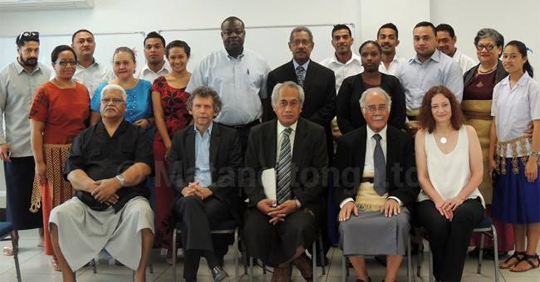Cross-border dispute resolution in the Pacific Islands

A workshop, organised by Associate Professor Petra Butler, was held in Tonga in September to help Pacific Islanders learn how to resolve cross-border disputes.
The focus of the workshop was on helping Pacific Island countries address whether, how and why to ratify the Convention on the Recognition and Enforcement of Foreign Arbitral Awards (1958) (New York Convention) and whether to adapt their laws to the UNCITRAL Model Law on International Commercial Arbitration.
The workshop was sponsored by the New Zealand Aid programme and the Centre for Small States, Queen Mary University in London, and was supported by Victoria University and the Tongan Women In Law Association (WILA).
Associate Professor Butler, who is Co-Director of the Centre for Small States, worked with VicLink to access Ministry of Foreign Affairs and Trade Pacific Island Countries Participation Funding to support attendance at the conference from several Pacific Island representatives.
She said the workshop brought together delegates to discuss the advantages for the Pacific Island States, Tonga and others to accede to ratify the New York convention.
“The idea is to have in-depth discussion and allow delegates to ask questions specifically to their jurisdictions.”
No Pacific Island country had ratified the New York Convention yet, she said.
Gary Born, a world-leading arbitration practitioner in London and chair of Wilmer Cutler Pickering Hale Dorr LPP's international arbitration practice group, who held the inaugural senior visiting research fellowship at Victoria University’s New Zealand Centre of International Economic Law earlier this year, carried out the workshop facilitated by Alisi Taumopeau, a former Minister of Justice and Attorney General.
Delegates from Tonga, Vanuatu, Solomon Islands, Papua New Guinea, Pacific Island Prosecutors Association Secretariat (PILON) from Samoa and Dr Edwin Kessie Chief Trade Advisor OCTA (Office of the Chief Trade Advisor) participated in the workshop.
Born said one of the objectives of the workshop was to raise awareness among Pacific Islands on the different forms of disputes and explore particular international arbitration means.
“The benefit for Tongan citizens, businesses and government is that when engaging in world trade with foreign parties whether from Asia, Europe, New Zealand and so forth it’s very important the terms of trade be conducted in a neutral playing field and disputes are resolved efficiently, expertly and mutually,” he said.
- sourced from Matangi Tonga
